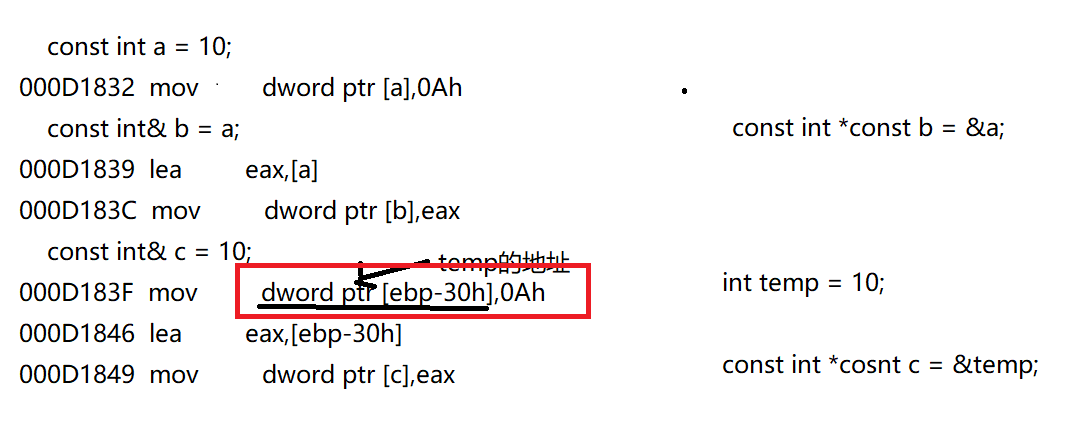1. Special Use of References
1 Basic Review
int main()
{
int a = 10;
const int b = 20;
//For integer a
int &c1 = a;
const int &c2 = a;
a = 2000; //You can modify the value of c2 through a
cout <<" a = "<< a << endl;
cout <<" c1 = "<<c1 << endl;
cout <<" c2 = "<<c2 << endl;
//For integer constant b
int &c3 = b; //error, a constant variable can only be referenced frequently
const int &c4 = b;
return 0;
}
Run result:

Summary:
Ordinary variables can be referenced either normally or frequently.
Constant variables can only be referenced frequently.
2 Literal value constant
Define an alias that frequently refers to b as a and a alias that frequently refers to c as the literal constant 10. Defines an integer reference d as an alias for the literal constant 10.
int main()
{
int a = 10;
const int &b = a;
//The above line of code corresponds to
//const int *const b = &a;
const int &c = 10;
//The above line of code corresponds to
//int tmp = 10;
//const int &c = &tmp;
//const int * const c = &tmp;
int &d = 10; //error
return 0;
}
Summary: Literal constants are always referenced directly by common references, but literal constants cannot be referenced directly by ordinary references.
Question: Think about whether the bottom two ways are the same?
Answer: Not the same
const int a = 10;
const int &b = a;
//The above two lines correspond to
//const int a = 10;
//const int *const b = &a;
const int &c = 10;
//The top row corresponds to
//int temp = 10;
//const int *cosnt c = &temp;
VS2019 generates disassembly as follows:
const int a = 10;
000D1832 mov dword ptr [a],0Ah
const int& b = a;
000D1839 lea eax,[a]
000D183C mov dword ptr [b],eax
const int& c = 10;
000D183F mov dword ptr [ebp-30h],0Ah
000D1846 lea eax,[ebp-30h]
000D1849 mov dword ptr [c],eax

Summary: From the above, it can be seen that there is a difference between referencing literal values and referencing ordinary variables.
A common reference to literal values requires that a temporary quantity be constructed to store the literal values.
3 Storage object array
Statically create an array of objects:
class Object
{
int value;
public:
Object(int x = 0) : value(x)
{
cout << "create:" << this << endl;
}
void Print() const
{
cout << value << endl;
}
~Object()
{
cout << "~Object:" << this <<endl;
}
};
Object obj3(4);
int main()
{
Object obj[10];
return 0;
}
g++ Output Results:
create:0x407030 create:0x61fdd0 create:0x61fdd4 create:0x61fdd8 create:0x61fddc create:0x61fde0 create:0x61fde4 create:0x61fde8 create:0x61fdec create:0x61fdf0 create:0x61fdf4 ~Object:0x61fdf4 ~Object:0x61fdf0 ~Object:0x61fdec ~Object:0x61fde8 ~Object:0x61fde4 ~Object:0x61fde0 ~Object:0x61fddc ~Object:0x61fdd8 ~Object:0x61fdd4 ~Object:0x61fdd0 ~Object:0x407030
Create object arrays dynamically using pointers:
int main()
{
int n;
cin >> n; //variable
Object *s = new Object(n); //Only one object, call constructor
Object *p = new Object[n]; //A set of objects
//Don't forget to free up space
delete[] p; //Square brackets release a group of objects.
delete s;
return 0;
}
Question 1: What happens when you construct a set of objects without a default constructor?
Answer: Error
class Object
{
int value;
public:
Object(int x) : value(x) //Delete default parameters
{
cout << "create:" << this << endl;
}
void Print() const
{
cout << value << endl;
}
~Object()
{
cout << "~Object:" << this <<endl;
}
};
Object obj3(4);
int main()
{
int n;
cin >> n; //variable
Object *s = new Object(n); //Only one object, call constructor
Object *p = new Object[n]; //A set of objects
//Don't forget to free up space
delete[] p; //Square brackets release a group of objects.
delete s;
return 0;
}
Compile and run:
error: no matching function for call to 'Object::Object()'
No constructor found
Question 2: Can you use this with Object *p = new Object[n] (23)? This means that each object has 23 to initialize.
Answer: Error
class Object
{
int value;
public:
Object(int x) : value(x) //Delete default parameters
{
cout << "create:" << this << endl;
}
void Print() const
{
cout << value << endl;
}
~Object()
{
cout << "~Object:" << this <<endl;
}
};
Object obj3(4);
int main()
{
int n;
cin >> n; //variable
Object *s = new Object(n); //Only one object, call constructor
Object *p = new Object[n](23); //A set of objects that you want to initialize with 23
//Don't forget to free up space
delete[] p; //Square brackets release a group of objects.
delete s;
return 0;
}
Compile:
error: parenthesized initializer in array new Object *p = new Object n;
The object takes new when the array is initialized.
Note: When writing a type, you must create a default constructor or you cannot create a set of objects.
Summary:
You can create a set of objects with new, but don't forget to free up the object space at the end.
When writing a type, you must create a default constructor, or you cannot create a set of objects.
Another use of 4 new
Next Update